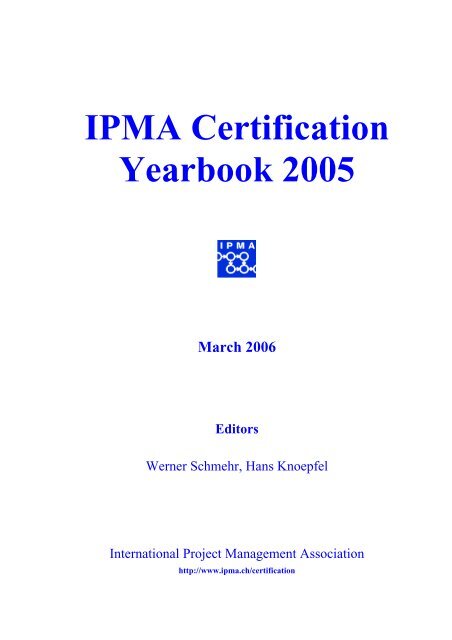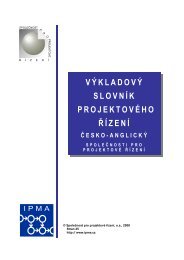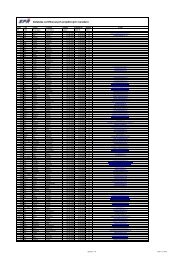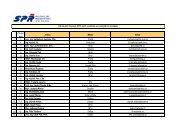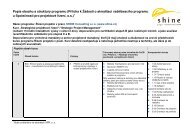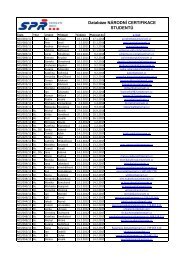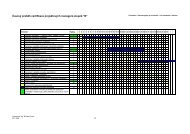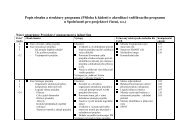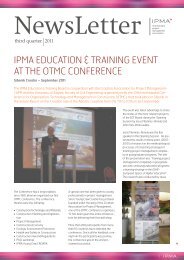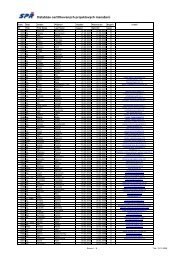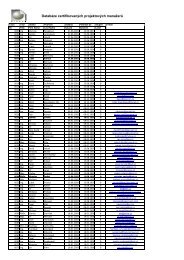IPMA Certification Yearbook 2005
IPMA Certification Yearbook 2005
IPMA Certification Yearbook 2005
Create successful ePaper yourself
Turn your PDF publications into a flip-book with our unique Google optimized e-Paper software.
<strong>IPMA</strong> <strong>Certification</strong><br />
<strong>Yearbook</strong> <strong>2005</strong><br />
March 2006<br />
Editors<br />
Werner Schmehr, Hans Knoepfel<br />
International Project Management Association<br />
http://www.ipma.ch/certification
International Project Management Association <strong>IPMA</strong> <strong>Certification</strong> <strong>Yearbook</strong> <strong>2005</strong><br />
2<br />
© <strong>2005</strong> International Project Management Association Version 1.00 / 31.03.2006
International Project Management Association <strong>IPMA</strong> <strong>Certification</strong> <strong>Yearbook</strong> <strong>2005</strong><br />
3<br />
Table of Content<br />
1 Preface ...............................................................................................................................4<br />
2 <strong>IPMA</strong> <strong>Certification</strong> Programme Status..........................................................................5<br />
3 Four Level <strong>Certification</strong> Programmes............................................................................6<br />
3.1 Overview.......................................................................................................................... 6<br />
3.2 <strong>Certification</strong> System......................................................................................................... 6<br />
3.3 General Structure and Principles...................................................................................... 8<br />
3.4 Organisation and Administration ..................................................................................... 9<br />
3.5 Worldwide Cooperation................................................................................................. 10<br />
3.6 National Competence Baselines..................................................................................... 10<br />
3.7 Standards........................................................................................................................ 13<br />
3.8 <strong>IPMA</strong> Competence Baseline (ICB)................................................................................ 13<br />
4 Number of Certificates...................................................................................................16<br />
4.1 <strong>IPMA</strong> Level A ..................................................... 16<br />
4.2 <strong>IPMA</strong> Level B ..................................................... 17<br />
4.3 <strong>IPMA</strong> Level C ..................................................... 18<br />
4.4 <strong>IPMA</strong> Level D ..................................................... 19<br />
5 Assessors of the <strong>Certification</strong> Bodies ............................................................................22<br />
5.1 List of First Assessors ..................................................... 22<br />
5.2 List of Actual Assessors ....... 25<br />
6 <strong>Certification</strong> Bodies ........................................................................................................30<br />
7 <strong>IPMA</strong> Validation ............................................................................................................34<br />
7.1 <strong>Certification</strong> Validation Management Board ................................................................. 34<br />
7.2 List of Validations.......................................................................................................... 35<br />
7.3 <strong>Certification</strong> Validation Panel <strong>2005</strong> Paris...................................................................... 36<br />
© <strong>2005</strong> International Project Management Association Version 1.00 / 31.03.2006
<strong>IPMA</strong> <strong>Certification</strong> <strong>Yearbook</strong> <strong>2005</strong><br />
4<br />
International Project Management Association<br />
1 Preface<br />
The universal <strong>IPMA</strong> Four Level <strong>Certification</strong> (4-L-C) system became operational in 1998 officially and<br />
world-wide after several years of development in our national associations.<br />
The certification programme of a member association starts with the nomination of the first assessors,<br />
the establishment of the certification body engaging important sectors of the economy, and the transfer<br />
of the <strong>IPMA</strong> Competence Baseline (ICB) to the National Competence Baseline (NCB) or the direct<br />
usage of <strong>IPMA</strong>’s ICB in the <strong>Certification</strong> Bodies Rules. The own assessors are trained during the first<br />
certification cycle with the assistance of an experienced assessor from an existing certification body.<br />
The <strong>IPMA</strong> approved first assessors are responsible for the validity of the system until the first validation<br />
process with the standard validation procedure is done by <strong>IPMA</strong>.<br />
The list of the certificates is not a part of the <strong>IPMA</strong> <strong>Certification</strong> <strong>Yearbook</strong>. The list is on the <strong>IPMA</strong> website<br />
(www.ipma.ch). Certificants can be searched and identified by name, country, level of their actual<br />
certificate with date of issue and expiry date. The list is updated at least every six months.<br />
In the year <strong>2005</strong>:<br />
• The <strong>IPMA</strong> level descriptions and the streamlined pyramid figure were applied worldwide as a basis<br />
for the training and certification of project management personnel.<br />
• The certification bodies of thirty national member associations were in operation. The great performance<br />
and the continuing high growth rates of the leading countries demonstrate how much<br />
potential is in the system.<br />
• The <strong>IPMA</strong> validation with the standard <strong>IPMA</strong> validation procedure was finished in Finland and<br />
Russia.<br />
• The individual certificates, the reduced version of the <strong>IPMA</strong> Competence Baseline (ICB) and the<br />
<strong>Certification</strong> <strong>Yearbook</strong> 2004 was available on the <strong>IPMA</strong> website.<br />
• <strong>IPMA</strong>’s large development project for revising the ICB during the years 2004 and <strong>2005</strong> is completed,<br />
the revised ICB will be published in May 2006.<br />
• Again a great quantitative growth in the project management certification was realised in the year<br />
<strong>2005</strong>. Until the end of <strong>2005</strong> about 45'500 certificates were awarded in total.<br />
• The <strong>IPMA</strong> four level certification system is continuing to animate a great professional development<br />
of the <strong>IPMA</strong> Member Associations and their members.<br />
The ICB as a global standard, the National Competence Baselines, the certification programmes of the<br />
national certification bodies and the global companies cooperating with <strong>IPMA</strong> are major flywheels for<br />
the project management promotion world-wide.<br />
Other empowering components are the bilateral co-operations between existing certification bodies<br />
and certification bodies that start a new programme.<br />
More and more project managers prefer <strong>IPMA</strong>'s four level system which fits to the personal development<br />
and career of individuals as well as to the competitiveness of the companies and the project<br />
management competence of their personnel.<br />
The Editors of the <strong>IPMA</strong> <strong>Certification</strong> Validation Management Board<br />
Werner Schmehr<br />
Member<br />
Hans Knoepfel<br />
Member<br />
Note<br />
The information in this yearbook may contain errors or non-actual information due to an imperfect retrieval, transfer or interpretation<br />
of data from the national certification bodies.<br />
<strong>IPMA</strong> endeavours to present correct data. However, <strong>IPMA</strong> does not accept any liability for the completeness and correctness of<br />
the information.<br />
To be sure it is necessary to contact the national certification body for getting the latest information.<br />
Version 1.00 / 31.03.2006<br />
© <strong>2005</strong> International Project Management Association
International Project Management Association <strong>IPMA</strong> <strong>Certification</strong> <strong>Yearbook</strong> <strong>2005</strong><br />
5<br />
2 <strong>IPMA</strong> <strong>Certification</strong> Programme Status<br />
Status January 2006<br />
Country agree- valida- Level 3)<br />
(member assoc. / certif. body) ment 1) tion 2) A B C D<br />
Austria (pma / zertifizierungsstelle) S V R RV 2) RV RV<br />
Azerbaijan (AZPMA) S VP R R R<br />
Brazil S R R R<br />
Bulgaria (BPMA) S P<br />
China P.R. (PMRC) S V RV RV RV RV<br />
Croatia S VP P R R R<br />
Czech Republic (SPR) S VP R R R<br />
Denmark (DPMA / CERT) S V R RV RV RV<br />
Egypt (MES / MPC) S V RV RV RV RV<br />
Finland S V/VP RVP RVP RV RVP<br />
France (AFITEP) S V RV RV RV RV<br />
Germany (GPM / PM-ZERT) S V RIV 4),6) RIV 4),6) RIV 4),6) RIV 4),6)<br />
Greece (HPMI)<br />
S<br />
Hungary (PMPEF) S V RV RV RV RV<br />
Iceland (VSF-CB) S VP R R R<br />
India (PMA) S P P R<br />
Ireland (PMI Ltd.) S V P RV RV RV<br />
Italy (ANIMP / PM-Sect) S VP R R R R<br />
Kazachstan (KPMA) S P<br />
Kuwait (KSE / KBMCB) S P<br />
Latvia (Latvia-PM-Cert) S P R<br />
Netherlands (PMI-NL/CitoCert) S V RIV RIV RIV RIV<br />
Norway (NFP) S R R R<br />
Poland (SPMP-Cert) S R R R R<br />
Portugal (APOGEP / Cert) S V RV RV RV<br />
Romania (PMR-Cert) S R R R<br />
Russia (SOVNET-CERT) S V RV RV RV RV<br />
Serbia-Montenegro (YUPMA) S P P P<br />
Slovak Rep. (SIPR / SPPR) S VP P R R R<br />
Slovenia (Slo Cert) S VP R R R R<br />
South Africa (APMSA-Cert) S P P P P<br />
Spain (AEIPRO / OCDP) S R R R<br />
Sweden (SPF) S VP P R R R<br />
Switzerland (SPM / VZPM) S V RA 5) V RA 5) V RA 5) V RA 5) V<br />
Taiwan, China (TPMA) S P<br />
Ukraine (UPMA / Cert) S V RIV RIV RIV RIV<br />
United Kingdom (APM) S R R R<br />
United States (asapm/PMCert) S P P<br />
38 14+(8) 15(+6) 28(+5) 28(+4) 30(+7)<br />
1) S: signed by end of <strong>2005</strong> or P: planned in 2006 or no plans until 2006 (empty)<br />
2) V: validated by end of <strong>2005</strong> with standard procedure or VP: planned in 2006 or no plans until 2006 (empty)<br />
3) R: realised by end of <strong>2005</strong> or P: planned in 2006 or no plans until 2006 (empty)<br />
4) I: ISO 9001 Certified<br />
5) A: Accredited (European Accreditation)<br />
6) A: Accreditation ISO/IEC 17 024 in progress<br />
© <strong>2005</strong> International Project Management Association Version 1.00 / 31.03.2006
<strong>IPMA</strong> <strong>Certification</strong> <strong>Yearbook</strong> <strong>2005</strong><br />
6<br />
International Project Management Association<br />
3 Four Level <strong>Certification</strong> Programmes<br />
3.1 Overview<br />
The International Project Management Association (<strong>IPMA</strong>) is a non-profit organisation, whose function<br />
is to be the prime promoter of project management (PM) internationally.<br />
<strong>IPMA</strong> started in 1965, under its former name of INTERNET, as a forum for the exchange of experience<br />
amongst project managers of international projects. It hosted its first international conference in<br />
1967 in Vienna, and since that time has developed steadily, as indeed has the discipline of project<br />
management itself.<br />
The membership of <strong>IPMA</strong> is primarily of national project management associations. The about 40<br />
member associations serve the specific needs of project management professionals in their own country<br />
in their own language. <strong>IPMA</strong> develops those needs at the international and global levels.<br />
To achieve this aim <strong>IPMA</strong> has developed a number of services encompassing research and development,<br />
education and training, standards and certification as well as conferences, seminars and<br />
workshops supported by a range of publications. In addition to its member associations, there are a<br />
number of other cooperating organisations and individual members who work with <strong>IPMA</strong> to promote<br />
project management internationally.<br />
An individual or company automatically supports <strong>IPMA</strong> if they become a member of a project management<br />
association which is a member of <strong>IPMA</strong>. If there is no Member Association in a country, then<br />
direct ‘international’ membership is available to them and the certification can be done with an existing<br />
certification body.<br />
The benefits of membership include:<br />
• Extensive networking opportunities<br />
• Promotion and support for conferences<br />
• Panels and workshops for exchange of experience<br />
• Internationally recognised qualification and certification<br />
• Participation in international research projects<br />
• International award<br />
• Bi-monthly International Journal<br />
• Quarterly Newsletter<br />
• Reduced entry fee for conferences.<br />
3.2 <strong>Certification</strong> System<br />
On June 14, 1998 in Ljubljana, Slovenia, the <strong>IPMA</strong> Council confirmed the establishment of <strong>IPMA</strong>'s<br />
universal four level system which was approved on February 28, 1998 in Bled. The certification programmes<br />
in project management were then going to be realised by the Member Associations.<br />
The certification schemes and systems of the certification bodies (as defined in the ISO/IEC standard<br />
17024) shall be an incentive for the project managers and the members of the project management<br />
teams (i.e. the project management personnel) to<br />
• expand and improve their technical, behavioural and contextual PM competence<br />
• continue their education and experience in PM<br />
• improve the quality of project management<br />
• last but not least – achieve the project objectives better.<br />
Version 1.00 / 31.03.2006<br />
© <strong>2005</strong> International Project Management Association
International Project Management Association <strong>IPMA</strong> <strong>Certification</strong> <strong>Yearbook</strong> <strong>2005</strong><br />
7<br />
The benefits of the certification are<br />
• for the project management personnel:<br />
an internationally acknowledged certificate of their PM competence<br />
• for the suppliers of project management services:<br />
a demonstration of their employees' professional competence<br />
• for the clients:<br />
more certainty to get the state-of-the-art services from project management professionals.<br />
For these purposes, a variety of competence elements of the project management personnel concerning<br />
the knowledge and experience in the technical, behavioural and contextual range are assessed.<br />
<strong>IPMA</strong> developed the universal four-level concept for the certification processes and scheme.<br />
The certification processes, scheme and system of a certification body that abides by the rules of<br />
<strong>IPMA</strong> will be validated and revalidated on a regular basis by <strong>IPMA</strong>.<br />
The main requirements for each level are derived from typical activities, responsibilities and requirements<br />
from practice. The <strong>IPMA</strong> four level certification is now shown as follows:<br />
Title Competence <strong>Certification</strong> Process Validity<br />
Stage 1 Stage 2 Stage 3<br />
Certified<br />
Projects<br />
Director<br />
(<strong>IPMA</strong> Level A)<br />
A<br />
Projects<br />
director report<br />
Certified<br />
Senior Project<br />
Manager<br />
(<strong>IPMA</strong> Level B)<br />
Certified<br />
Project<br />
Manager<br />
(<strong>IPMA</strong> Level C)<br />
knowledge,<br />
experience<br />
B<br />
C<br />
Project report<br />
Written exam.<br />
Options:<br />
work-shop,<br />
short project<br />
report<br />
Application,<br />
Curriculum<br />
vitae,<br />
project list,<br />
references,<br />
self assessment<br />
Interview<br />
5 years<br />
Certified<br />
Project<br />
Management<br />
Associate<br />
(<strong>IPMA</strong> Level D)<br />
knowledge<br />
D<br />
Application,<br />
Curriculum<br />
vitae, self<br />
assessment<br />
Written exam<br />
not<br />
limited<br />
option:<br />
10<br />
years<br />
Figure 1 <strong>IPMA</strong> Four Level <strong>Certification</strong> System<br />
<strong>IPMA</strong> Level A Certified Projects Director<br />
Shall be able to direct all projects of a company or branch or all projects of a programme.<br />
<strong>IPMA</strong> Level B Certified Senior Project Manager<br />
Shall be able to manage complex projects him / herself.<br />
<strong>IPMA</strong> Level C Certified Project Manager<br />
Shall be able to manage non-complex projects him / herself and / or to assist the manager<br />
of a complex project in all competence elements of project management.<br />
<strong>IPMA</strong> Level D Certified Project Management Associate<br />
Shall have the project management knowledge in all competence elements.<br />
© <strong>2005</strong> International Project Management Association Version 1.00 / 31.03.2006
<strong>IPMA</strong> <strong>Certification</strong> <strong>Yearbook</strong> <strong>2005</strong><br />
8<br />
International Project Management Association<br />
The levels are not restrained to hierarchical thinking. A project management specialist on the <strong>IPMA</strong><br />
Level D may be, apart from his fundamental knowledge in project management, a highly qualified,<br />
experienced and recognised expert in a special field. For example, he or she may own an additional<br />
credential in cost management. On each level most professional work can be done for the respective<br />
range of tasks and decisions, in a local or regional or national or in an international context.<br />
The levels are suitable for career track and maturity models as well as for personnel development and<br />
benchmarking programmes of companies and other organisations.<br />
The <strong>IPMA</strong> Level D represents the requirements of the professional associations for project management<br />
knowledge provided by the education and training in project management for its use in practice.<br />
A member association is responsible for developing and managing its own project management<br />
qualification and certification processes and scheme and for establishing the national certification<br />
body.<br />
<strong>IPMA</strong> owns and maintains its universal system for validating the national certifications to coordinate<br />
and harmonise the certifications regarding the <strong>IPMA</strong> general structure and principles.<br />
3.3 General Structure and Principles<br />
The general structure for all levels is shown in the <strong>IPMA</strong> Competence Baseline (ICB) which includes<br />
the description of the PM competence elements and the taxonomy for the assessment of the project<br />
management personnel.<br />
The principles for an <strong>IPMA</strong> validated project management qualification and certification are the content<br />
of the Agreement between <strong>IPMA</strong> and a member association and the <strong>IPMA</strong> <strong>Certification</strong> Regulations<br />
and Guidelines (ICRG).<br />
The following stages are the compulsory elements of the qualification and certification processes:<br />
<strong>IPMA</strong> Level A<br />
• application, self-assessment and project portfolio or programme proposal<br />
• project director report<br />
• interview<br />
<strong>IPMA</strong> Level B<br />
• application, self-assessment and project proposal<br />
• project report<br />
• interview<br />
<strong>IPMA</strong> Level C<br />
• application and self-assessment<br />
• written exam with direct questions and intellectual tasks<br />
• interview<br />
<strong>IPMA</strong> Level D<br />
• application and self-assessment<br />
• written exam with direct questions and open essays<br />
The organisation, the procedures and the forms shall be described in the documentation of the certification<br />
body. They should fulfil the requirements of the standard ISO / IEC 17024. It is recommended<br />
that each certification body is accredited by the national governmental institute which ideally should be<br />
a member of the European Accreditation (EA) and the International Accreditation Forum (IAF).<br />
Version 1.00 / 31.03.2006<br />
© <strong>2005</strong> International Project Management Association
International Project Management Association <strong>IPMA</strong> <strong>Certification</strong> <strong>Yearbook</strong> <strong>2005</strong><br />
9<br />
3.4 Organisation and Administration<br />
The Council of <strong>IPMA</strong> set up the certification validation organisation shown in the figure below.<br />
<strong>IPMA</strong> Council<br />
<strong>IPMA</strong><br />
Executive Board<br />
<strong>IPMA</strong> <strong>Certification</strong><br />
Validation Management<br />
Board<br />
Network of National Associations<br />
Validators<br />
Network of National <strong>Certification</strong> Bodies<br />
with <strong>IPMA</strong> <strong>Certification</strong> Validation Panel<br />
Figure 2 <strong>IPMA</strong> Validation Organisation<br />
The organisational units are<br />
• the national certification bodies (CB) which are designated by the member associations (MA)<br />
and are responsible for the qualification and certification scheme and system<br />
• the <strong>IPMA</strong> certification validation panel (CVP), consisting of the representatives of the national<br />
certification bodies and their assessors, for exchanging experience and making recommendations<br />
for improving <strong>IPMA</strong>'s harmonisation and validation of the certification schemes and systems<br />
• the validators who visit the national certification bodies, audit their qualification and certification<br />
schemes and systems and recommend improvements<br />
• the <strong>IPMA</strong> certification validation management board (CVMB) which is operating and improving<br />
<strong>IPMA</strong>'s universal system for validating the project management qualification and competence<br />
schemes and systems of the certification bodies<br />
• the <strong>IPMA</strong> Executive Board and the <strong>IPMA</strong> Council of Delegates who make the general decisions<br />
concerning the qualification and certification system and appoint the management board.<br />
<strong>IPMA</strong> maintains a register of all acknowledged certificates of individuals and organisations awarded by<br />
the bodies for certification of all member associations.<br />
The certification bodies administer their confidential documentation of the candidates and the personnel<br />
of the certification body including the assessors. They process the certification and provide the<br />
information about their qualification and certification scheme and system.<br />
© <strong>2005</strong> International Project Management Association Version 1.00 / 31.03.2006
<strong>IPMA</strong> <strong>Certification</strong> <strong>Yearbook</strong> <strong>2005</strong><br />
10<br />
International Project Management Association<br />
3.5 Worldwide Cooperation<br />
38 National Associations have now signed the agreement with <strong>IPMA</strong> about the qualification and certification<br />
programmes. The certification of project management personnel on several <strong>IPMA</strong>-levels is in<br />
operation in 30 countries. Several more countries are on the way to their certification programme<br />
according to the 4-L-C system of <strong>IPMA</strong> and other countries are extending their certification programme<br />
to more <strong>IPMA</strong> levels.<br />
In the universal system of <strong>IPMA</strong> the certification is on four conceptual levels. The competence is the<br />
demonstrated ability to apply knowledge, skills, experience and other personal attributes, as defined in<br />
the certification scheme. The assessment is made by experienced and independent experts (assessors)<br />
who know well the relevant project management practice. In addition to evidence in writing, the<br />
candidates present themselves in person to the assessors.<br />
The qualification and certification processes, schemes and systems are a major point of discussion for<br />
project management associations around the globe for several years. The main partners in the<br />
world-wide cooperation for the qualification and certification of project management personnel are<br />
• <strong>IPMA</strong> (International Project Management Association)<br />
• PMI (Project Management Institute)<br />
• AIPM (Australian Institute for Project Management)<br />
and the Project Management Society in Japan<br />
The Steering Committee has organised one or two Global Forum meetings per year as well as meetings<br />
of international standards committees.<br />
3.6 National Competence Baselines<br />
The 4 NCBs that were the basis of the first ICB are presented first. Then the NCBs that were developed<br />
after the first ICB issue are listed in alphabetic order of the countries and member associations.<br />
United Kingdom<br />
• Body of Knowledge, Association for Project Management (APM), 5th Edition (2006), U.K.,<br />
published first in 1992<br />
Switzerland<br />
• Beurteilungsstruktur, Verein zur Zertifizierung im Projektmanagement (VZPM), Zürich,<br />
Version 3.00, 31.7.2003, published first in 1996<br />
• Instrument d'appréciation, Verein zur Zertifizierung im Projektmanagement (VZPM), Zürich,<br />
Version 3.00, 31 juillet 2003, Edition juillet 2003<br />
France<br />
• Référentiel de Compétences en Management de Projet, National Competence Baseline, AFITEP,<br />
version 5, février 2004, Paris, published first in 1996<br />
Germany<br />
• PM-KANON, Bewertungsunterlagen zur Beurteilung der PM-Kompetenz, GPM / PM-ZERT,<br />
Germany, version 05, 05.2002, published first in 1998.<br />
• using the <strong>IPMA</strong> Competence Baseline, version 2.0b, 2001, from <strong>2005</strong><br />
Version 1.00 / 31.03.2006<br />
© <strong>2005</strong> International Project Management Association
International Project Management Association <strong>IPMA</strong> <strong>Certification</strong> <strong>Yearbook</strong> <strong>2005</strong><br />
11<br />
Austria<br />
• pm baseline, Wissenselemente zum Projekt und Programmmanagement sowie zum Management<br />
Projektorientierter Organisationen, pma, Version 2.3, January <strong>2005</strong>, Vienna, published first in<br />
1999.<br />
Azerbaijan<br />
• Project Management: National Competence Baseline/National <strong>Certification</strong> System/ Basis of Professional<br />
Knowledge. Baku-2002 (in Azeri language).<br />
• Basis of Professional Knowledge by Project Management. / National Competence Baseline /<br />
Baku-2004. (in Russian language)<br />
• International <strong>Certification</strong> Body by Project Management/<strong>IPMA</strong> – B, C, and D. Baku- 2004<br />
(in Azeri language).<br />
Brazil<br />
• Referencial Brasileiro de Competências em Gerenciamento de Projetos (RBC), Versão 1.1<br />
Janeiro de <strong>2005</strong>.<br />
China<br />
• Chinese-Project Management Body of Knowledge & Chinese-National Competence Baseline C-<br />
PMBOK&C-NCB, first edition 2001.<br />
Croatia<br />
• National Competence Baseline, version 0, 2001.<br />
Czech Republic<br />
• Projektové rizeni, (standard CR dle <strong>IPMA</strong>), Project Management (Czech Republic Body of Knowledge),<br />
SD 02.1, 2000.<br />
Denmark<br />
• “Kompetencer I projektledelse” (Competencies in Project Management) First published June 2002<br />
• New version in Danish and English will be published in February <strong>2005</strong>.<br />
Egypt<br />
• Egyptian competence Baseline ECB, Version 2.0 MES PM CERT ( MPC ) Cairo, 02.02.2002<br />
(English & Arabic ).<br />
Finland<br />
• Projektin Johdon Pätevyys - National Competence Baseline Finland, Version 2, May 2004<br />
(in Finnish and English), published first in May 1997<br />
Hungary<br />
• <strong>IPMA</strong> szerinti vizsgakövetelmények és vizgarend, version 1.0 published in May 2002.<br />
Iceland<br />
• Hugtakalykill - National Competence Baseline, third edition, November 2004,<br />
first edition published in December 2001<br />
India<br />
• National Competence Baseline June <strong>2005</strong>.<br />
Ireland<br />
• NCBI –National Competence Base Line for Ireland , Version 1.0, published first in 2001<br />
Italy<br />
• Manuale delle Competenze di Project Management, edizione 3, Marzo 2004<br />
• Manuale per la Certificazione dei Project Manager Livelli A, B, C, D- Linee Guida e regolamenti<br />
edizione 7, 1° gennaio 2006<br />
© <strong>2005</strong> International Project Management Association Version 1.00 / 31.03.2006
<strong>IPMA</strong> <strong>Certification</strong> <strong>Yearbook</strong> <strong>2005</strong><br />
12<br />
International Project Management Association<br />
Kuwait<br />
• Kuwait Competence Baseline KCB<br />
Latvia<br />
• National Competence Baseline, Version 1, 2004<br />
Netherlands<br />
• Nederlandse Competence Baseline, Version 2.0, <strong>2005</strong><br />
Norway<br />
• “Kompetencer I projektledelse” – Danish (Competencies in Project Management). First published<br />
in 2002<br />
• Competencies in Project Management (National Competence Baseline for Scandinavia) published<br />
in February January <strong>2005</strong><br />
Poland<br />
• Polskie Wytyczne Kompetencji <strong>IPMA</strong> Wersja 1.2<br />
Portugal<br />
• Especificação de Competências para Gestores de Projecto, Version 3.0, APOGEP,<br />
Agosto de 2002<br />
Romania<br />
• SR 13465 :2002, version 1, published first in 2002<br />
Russia<br />
• Project Management: A Framework of Professional Knowledge, National Competence Baseline,<br />
Moscow: SOVNET, 2001, - 265 p.<br />
Serbia-Montenegro<br />
• Nacionalna osnova za ocenjivanje kompetentnosti / National Competence Baseline, Version 1.05,<br />
Belgrade, <strong>2005</strong><br />
Slovak Republic<br />
• S P S - Súbor požadovaných schopností pre odborníkov na projektové riadenie, version 2,<br />
Trnava-Bratislava, 2002<br />
Slovenia<br />
• SZPM – Struktura znany projektnega managementa, published first in 1998<br />
South Africa<br />
• Services SETA/PM Chamber is developing national qualification frameworks and standards;<br />
APMSA is embarking on ICB<br />
Spain<br />
• Bases para la competencia en dirección de Proyectos, version 2.0, OCDP, Zaragoza,<br />
2002, first published in October 2000<br />
Sweden<br />
• Kompetens i Projektledning, Version 2.1, published in November 2004<br />
Ukraine<br />
• Ukraine National Competence Baseline, UPMA, Version 2.0, Kiev, 2003, published first in 2000<br />
United States<br />
• US National Competence Baseline, in preparation<br />
Version 1.00 / 31.03.2006<br />
© <strong>2005</strong> International Project Management Association
International Project Management Association <strong>IPMA</strong> <strong>Certification</strong> <strong>Yearbook</strong> <strong>2005</strong><br />
13<br />
3.7 Standards<br />
• <strong>IPMA</strong> Competence Baseline (ICB), Version 3.0, March 2006,<br />
International Project Management Association,<br />
will supersede <strong>IPMA</strong> Competence Baseline (ICB), Version 2.0b, Bremen, 1999/2001.<br />
• ISO Standard EN ISO/IEC 17'024:2003<br />
General requirements for bodies operating certification of persons<br />
(superseded EN 45013:1989).<br />
3.8 <strong>IPMA</strong> Competence Baseline (ICB)<br />
To be professional, the discipline of Project Management has to have rigorous standards and guidelines<br />
to define the work of the project management personnel. These requirements are defined by<br />
collecting, processing and institutionalising the accepted and applied competence in project management.<br />
In the <strong>IPMA</strong> Competence Baseline (ICB), the knowledge and experience expected from the<br />
project managers and their staff (project management personnel) are presented by a PM competence<br />
element descriptions and a taxonomy.<br />
The ICB contains basic terms, tasks, practices, skills, functions, management processes, methods,<br />
techniques and tools that are commonly used in project management, as well as advanced knowledge,<br />
where appropriate, of innovative and advanced practices used in more limited situations. The<br />
ICB is not a textbook and not a cookbook. It offers an access to the knowledge and experience in<br />
project management. It is the basis for all certification programmes of the national associations and<br />
their certification bodies that are validated by the International Association of Project Management<br />
(<strong>IPMA</strong>).<br />
In 1985 the Project Management Institute (PMI) in North America elaborated a „Body of Knowledge<br />
(BOK)“ for Project Management. This document and later versions until the actual „Guide to the Project<br />
Management Body of Knowledge“ have been the basis for the knowledge test for the Project<br />
Management Professional (PMP).<br />
<strong>IPMA</strong> (at that time called INTERNET) made an inquiry with their members about the need for certification<br />
in 1987. The majority of the answers were positive. The leading professional project management<br />
associations were then establishing their baselines for the assessment of project management<br />
competence during the next ten years. The Association of Project Managers (APM) in the United<br />
Kingdom published the first version of its „BOK“ in 1991. In other European countries, similar projects<br />
and development work were done in the first half of the nineties, sometimes in connection with training<br />
material. A general distinction has been made between the processes, the scheme and the system<br />
(responsibilities and procedures) for the certification.<br />
From 1993 the <strong>IPMA</strong> <strong>Certification</strong> Core Team (CCT) was charged with the coordination and harmonisation<br />
of the national projects and achievements. A first agreement was elaborated to establish<br />
an international framework for developing the national documents for the certification. In this process<br />
the sunflower was used as an instrument for the harmonisation and finally as the logo for the ICB<br />
Version 2.0. The emphasis was not on the ranges of project management competence but on the<br />
competence elements of project management knowledge and experience.<br />
In 1997 the <strong>IPMA</strong> <strong>Certification</strong> Validation Management Board (CVMB) took over the further developments<br />
and the co-ordination of the member associations’ qualification and certification processes,<br />
schemes and systems. In 1998 the <strong>IPMA</strong> Council accepted the standard agreement between a mem-<br />
© <strong>2005</strong> International Project Management Association Version 1.00 / 31.03.2006
<strong>IPMA</strong> <strong>Certification</strong> <strong>Yearbook</strong> <strong>2005</strong><br />
14<br />
International Project Management Association<br />
ber association and <strong>IPMA</strong> and approved the universal four level concept. The ICB was submitted to<br />
the National Associations as version 1.0 for comments in 1998 and then published the first time by<br />
<strong>IPMA</strong> as version 2.0 in February 1999.<br />
The Version 2.0 of the ICB was in three languages: English, German and French. It was established<br />
on the basis of the National Competence Baselines of APM (the U.K. Body of Knowledge), VZPM (the<br />
Swiss Assessment Structure), PM-ZERT (the German Projektmanagement-Kanon) and AFITEP (the<br />
French Assessment Criteria). From these National Competence Baselines as much elements as possible<br />
were adopted or slightly modified.<br />
The <strong>IPMA</strong> Competence Baseline is used as a reference basis for all substantial normative documents<br />
for the <strong>IPMA</strong> validated qualification and certification schemes as well as for referencing of the project<br />
management competence in theory and practice (e.g. project management literature, research projects,<br />
education, training and continuing professional development and reports about the management<br />
of projects). The ICB reflects the principles for the project management competence assessment that<br />
are commonly accepted within the <strong>IPMA</strong>. By consequence, it influences, and is influenced, by developments<br />
on the national competence baselines.<br />
Each national association is responsible for establishing its own detailed documents for its qualification<br />
and certification, especially the National Competence Baseline (NCB). This documentation is valid<br />
for the certification. A certain freedom shall be available for including national cultures and the advancement<br />
of the project management competence. On the other hand the <strong>IPMA</strong> harmonisation is<br />
responding to the requirements of companies and organisations that are active internationally.<br />
The ICB Version 2.0 was established in 1999 and consisted of 42 elements for knowledge and experience<br />
in project management (28 core elements and 14 additional elements) as well as 8 aspects<br />
for personal attitudes and 10 aspects for the general impression. <strong>IPMA</strong> required that all 28 core elements<br />
and at least 6 additional elements chosen by the nation as well as the aspects for personal<br />
attitudes and the general impression are accepted in a NCB. However up to eight of the additional<br />
elements for knowledge and experience (i.e. about 20% of the 42 elements) could be eliminated or<br />
replaced by new elements for taking the national characteristics and new developments in project<br />
management into account. A minor revision of the ICB was made in April 2001.<br />
A major revision of the ICB started in 2004 and was finished in March 2006. The ICB Version 3.0<br />
(2006) consists of 46 competence elements (see next page):<br />
• 20 technical competence elements dealing with the project management matter on which<br />
the professionals are working<br />
• 15 behavioural competence elements dealing with the personal relationships between the<br />
individuals and groups managed in the projects, programmes and portfolios<br />
• 11 contextual competence elements dealing with the interaction of the project management<br />
with the context of the project and within the permanent organisations<br />
For each competence element, the knowledge and the experience are assessed using a scale with<br />
values from 0 (no competence) to 10 (absolute maximum) are used.<br />
The eye of competence represents the integration of all elements of project management as seen<br />
through the eyes of the project managers when evaluating a specific situation. The eye also represents<br />
clarity and vision.<br />
Version 1.00 / 31.03.2006<br />
© <strong>2005</strong> International Project Management Association
International Project Management Association <strong>IPMA</strong> <strong>Certification</strong> <strong>Yearbook</strong> <strong>2005</strong><br />
15<br />
Technical competence<br />
elements<br />
Behavioural competence<br />
elements<br />
Contextual competence<br />
elements<br />
1.01<br />
1.02<br />
Project management<br />
success<br />
Interested parties<br />
2.01 Leadership 3.01 Project orientation<br />
2.02 Engagement & motivation 3.02 Programme orientation<br />
1.03<br />
Project requirements<br />
& objectives<br />
2.03 Self-control 3.03 Portfolio orientation<br />
1.04 Risk & opportunity 2.04 Assertiveness 3.04<br />
Project, programme &<br />
portfolio implementation<br />
1.05 Quality 2.05 Relaxation 3.05 Permanent organisation<br />
1.06 Project organisation 2.06 Openness 3.06 Business<br />
1.07 Teamwork 2.07 Creativity 3.07<br />
Systems, products &<br />
technology<br />
1.08 Problem resolution 2.08 Results orientation 3.08 Personnel management<br />
1.09 Project structures 2.09 Efficiency 3.09<br />
Health, security, safety<br />
& environment<br />
1.10 Scope & deliverables 2.10 Consultation 3.10 Finance<br />
1.11 Time & project phases 2.11 Negotiation 3.11 Legal<br />
1.12 Resources 2.12 Conflict & crisis<br />
1.13 Cost & finance 2.13 Reliability<br />
1.14 Procurement & contract 2.14 Values appreciation<br />
1.15 Changes 2.15 Ethics<br />
1.16 Control & reports<br />
1.17<br />
Information &<br />
documentation<br />
1.18 Communication<br />
1.19 Start-up<br />
1.20 Close-out<br />
© <strong>2005</strong> International Project Management Association Version 1.00 / 31.03.2006
<strong>IPMA</strong> <strong>Certification</strong> <strong>Yearbook</strong> <strong>2005</strong><br />
16<br />
International Project Management Association<br />
4 Number of Certificates<br />
First number in tables 4.1 to 4.4: new certificates. Second number: renewed certificates.<br />
Numbers in italic letters are estimates.<br />
4.1 <strong>IPMA</strong> Level A<br />
Country<br />
(nat. assoc. / certif. body)<br />
1995 1996 1997 1998 1999 2000 2001 2002 2003 2004 <strong>2005</strong> 2006<br />
plan<br />
Austria (pma / zertif.stelle) 1 2 0 0 2<br />
Azerbaijan (AZPMA) 0 0<br />
Brazil 0 0<br />
Bulgaria (BPMA) 0 0<br />
China P.R. (PMRC) 4 0 1 5 10<br />
Croatia 0 1<br />
Czech Republic (SPR) 0 0<br />
Denmark (DPMA / CERT) 3 5<br />
Egypt (MES / MPC) 1 0 0 2<br />
Finland 1 0<br />
France (AFITEP) 5 2 5 0 2 0 0 1 1 0 1<br />
Germany (GPM / PM-ZERT) 3 0 2 4 5 3 8+4<br />
Hungary (PMPEF) 4 2 0 5<br />
Iceland (VSF-CB) 0 0<br />
India (PMA) 0 10<br />
Ireland (PMI Ltd.) 1 0 1<br />
Italy (ANIMP / PM-Sect) 1 0 2 4<br />
Kuwait (KSE / KBMCB) 0 5<br />
Latvia (Latvia-PM-Cert) 0 0<br />
Netherlands (PMI-NL/CitoCert) 1 0 0 3<br />
Norway (NFP) 0 0<br />
Poland (SPMP-Cert) 1 0 0 2<br />
Portugal (APOGEP / Cert) 0 0<br />
Romania (PMR-Cert) 0 0<br />
Russia (SOVNET-CERT) 1 1 0 0 1<br />
Serbia-Montenegro (YUPMA) 0<br />
Slovak Rep. (SIPR / SPPR) 0 2<br />
Slovenia (Slo Cert) 0 1 0 1<br />
South Africa (APMSA-Cert) 0 0<br />
Spain (AEIPRO / OCDP) 0<br />
Sweden (SPF) 0 5<br />
Switzerland (SPM / VZPM) 6 3 5<br />
Ukraine (UPMA / Cert) 1 0 0 0 0 0 1 1<br />
United Kingdom (APM) 0 0<br />
United States (asapm/PMCert) 0 0<br />
<strong>IPMA</strong> Level A per year 0 5 2 5 1 5 0 8 16 17 18 78<br />
Version 1.00 / 31.03.2006<br />
© <strong>2005</strong> International Project Management Association
International Project Management Association <strong>IPMA</strong> <strong>Certification</strong> <strong>Yearbook</strong> <strong>2005</strong><br />
17<br />
4.2 <strong>IPMA</strong> Level B<br />
Country<br />
(nat. assoc. / certif. body)<br />
1995 1996 1997 1998 1999 2000 2001 2002 2003 2004 <strong>2005</strong> 2006<br />
plan<br />
Austria (pma / zertif.stelle) 18 27 41 29 16 27+6 35+7 62+4 83+18 66+17 104+42 80+60<br />
Azerbaijan (AZPMA) 0 1 0 2<br />
Brazil 5 10<br />
Bulgaria (BPMA) 0 0<br />
China P.R. (PMRC) 9+0 17+0 34+0 38+0 100+0<br />
Croatia 0 1 3<br />
Czech Republic (SPR) 4 0 10 3 3 35<br />
Denmark (DPMA / CERT) 4 20 11 12 22 38 25+13 39 26 50<br />
Egypt (MES / MPC) 3 7 9 4 4+5 3 4<br />
Finland 5 0 1 0 1 0 7 5 5+0 5<br />
France (AFITEP) 5 10 10 0 5 2 5 3 3 6 5<br />
Germany (GPM / PM-ZERT) 9 21 10 14+4 25+10 23+8 5+11 38+10 37+18 69+15 89+30 70+66<br />
Hungary (PMPEF) 5 3 6 12 30<br />
Iceland (VSF-CB) 7 2 0 1 0 3+6 7+2 5 5 10<br />
India (PMA) 0 0 25<br />
Ireland (PMI Ltd.) 3 10 10 10 15<br />
Italy (ANIMP / PM-Sect) 3 4 8 13 15<br />
Kuwait (KSE / KBMCB) 0 10<br />
Latvia (Latvia-PM-Cert) 0 0 0<br />
Netherlands (PMI-NL/CitoCert) 17 6 6 1 0 1+3 5 11 9 14 16 35<br />
Norway (NFP) 3 12<br />
Poland (SPMP-Cert) 2 1 1 5<br />
Portugal (APOGEP / Cert) 5 0 0 3 0 3 1+3 1+2<br />
Romania (PMR-Cert) 0 6 10 15<br />
Russia (SOVNET-CERT) 2 4 4 2 3 4 7+4 6+6<br />
Serbia-Montenegro (YUPMA) 0 0 10<br />
Slovak Rep. (SIPR / SPPR) 7 3 7 8 8<br />
Slovenia (Slo Cert) 10 5 9 6 11 9+8 1+0 0 1+0<br />
South Africa (APMSA-Cert) 0 20<br />
Spain (AEIPRO / OCDP) 2 1 0 5<br />
Sweden (SPF) 11 35 25 24 40<br />
Switzerland (SPM / VZPM) 4 6 10 13+4 21+6 30+4 36+6 36+14 60+22 108+23 122+26<br />
Ukraine (UPMA / Cert) 1 2 5 6 2 1 6 5<br />
United Kingdom (APM) (119)* 10 12 40 24 21 40<br />
United States (asapm/PMcert) 0 30<br />
<strong>IPMA</strong> Level B per year 44 63 89 100 93 131 158 300 424 459 627 984<br />
()* Total to date<br />
© <strong>2005</strong> International Project Management Association Version 1.00 / 31.03.2006
<strong>IPMA</strong> <strong>Certification</strong> <strong>Yearbook</strong> <strong>2005</strong><br />
18<br />
International Project Management Association<br />
4.3 <strong>IPMA</strong> Level C<br />
Country<br />
(nat. assoc. / certif. body)<br />
1995 1996 1997 1998 1999 2000 2001 2002 2003 2004 <strong>2005</strong> 2006<br />
plan<br />
Austria (pma / zertif.stelle) 5 81 132 197 211+8 300+40 274+71 330+90<br />
Azerbaijan (AZPMA) 3 13 2 4 15<br />
Brazil 1 20<br />
Bulgaria (BPMA) 0 5<br />
China P.R. (PMRC) 136 1219 1587+0 1861+0 1341+0 1300+0<br />
Croatia 6 10 5 32 35<br />
Czech Republic (SPR) 10 10 9 30<br />
Denmark (DPMA / CERT) 5 40 10 44 77+8 90 145 200<br />
Egypt (MES / MPC) 5 65 65 57 67+11 50+27 35 32<br />
Finland 4 51 75 140 137 171+44 125<br />
France (AFITEP) 1 0 24 6 10 0 5 1 10 0 10<br />
Germany (GPM / PM-ZERT) 16 26 20 15 24 73+0 62+3 123+15 100+74 171+22 140+133<br />
Hungary (PMPEF) 1 7 1 5 30<br />
Iceland (VSF-CB) 9 18 6 15<br />
India (PMA) 0 0 50<br />
Ireland (PMI Ltd.) 81 73 70 89 110<br />
Italy (ANIMP / PM-Sect) 8 14 11 8 11 20<br />
Kuwait (KSE / KBMCB) 0 10<br />
Latvia (Latvia-PM-Cert) 0 0 3<br />
Netherlands (PMI-NL/CitoCert) 6 1 0 0 41 53 101 104 140<br />
Norway (NFP) 9 15<br />
Poland (SPMP-Cert) 12 7 29 29 40<br />
Portugal (APOGEP / Cert) 11 20 16 17 12+7<br />
Romania (PMR-Cert) 0 11 4 10<br />
Russia (SOVNET-CERT) 3 3 14 3 19 29 30+3 35+17<br />
Serbia-Montenegro (YUPMA) 0 10<br />
Slovak Rep. (SIPR / SPPR) 1 4 26 11 22 16<br />
Slovenia (Slo Cert) 0 1 0 1<br />
South Africa (APMSA-Cert) 0 80<br />
Spain (AEIPRO / OCDP) 9 5 4 7<br />
Sweden (SPF) 20 30 40 29+7 40+5<br />
Switzerland (SPM / VZPM) 3 21 37 39+1 102+14 95+25<br />
Ukraine (UPMA / Cert) 10 9 21 19 40 45 61 80<br />
United Kingdom (APM) (94)* 100 26 43 72 115 215<br />
United States (asapm/PMcert) 0 0<br />
<strong>IPMA</strong> Level C per year 0 17 26 50 50 236 623 1929 2660 3205 2977 3546<br />
()* Total to date<br />
Version 1.00 / 31.03.2006<br />
© <strong>2005</strong> International Project Management Association
International Project Management Association <strong>IPMA</strong> <strong>Certification</strong> <strong>Yearbook</strong> <strong>2005</strong><br />
19<br />
4.4 <strong>IPMA</strong> Level D<br />
Country<br />
(nat. assoc. / certif. body)<br />
1995 19961997 1998 1999 2000 2001 2002 2003 2004 <strong>2005</strong> 2006<br />
plan<br />
Austria (pma / zertif.stelle) 57 73 77 135 177 314 467 420<br />
Azerbaijan (AZPMA) 23 20 5 14 30<br />
Brazil 7 80<br />
Bulgaria (BPMA) 0 10<br />
China P.R. (PMRC) 33 194 323 434 1349 1500<br />
Croatia 0 5 34 35<br />
Czech Republic (SPR) 21 31 50 97 53 40<br />
Denmark (DPMA / CERT) 11 59 90 210 199 400<br />
Egypt (MES / MPC) 9 40 28 37+1 43+5 43 46<br />
Finland 0 20 14 35<br />
France (AFITEP) 8 56 201 319 272 167 200<br />
Germany (GPM / PM-ZERT) (3150)* 26 103 325 702 1023 1287 1327 1040<br />
Hungary (PMPEF) 3 7 1 3 30<br />
Iceland (VSF-CB) 1 9 57 25<br />
India (PMA) 12 27 66 136 210 444 800<br />
Ireland (PMI Ltd.) 146 113 117 108 110<br />
Italy (ANIMP / PM-Sect) 18 15 12 20 21 18 50<br />
Kuwait (KSE / KBMCB) 0 20<br />
Latvia (Latvia-PM-Cert) 0 3 10 10<br />
Netherlands (PMI-NL/CitoCert) 2 9 13 41 42 105 111 230 290 330<br />
Norway (NFP) 15 20<br />
Poland (SPMP-Cert) 0 17 77 300<br />
Portugal (APOGEP / Cert) 19 24 27 57 43 40<br />
Romania (PMR-Cert) 2 13 4 5<br />
Russia (SOVNET-CERT) 6 7 36 12 76 153 114 120<br />
Serbia-Montenegro (YUPMA) 0 0 30<br />
Slovak Rep. (SIPR / SPPR) 1 5 4 9 30 22<br />
Slovenia (Slo Cert) 9 3 0 3<br />
South Africa (APMSA-Cert) 0 200<br />
Spain (AEIPRO / OCDP) 31 42 43 28 9 0 30<br />
Sweden (SPF) 15 32 99 72 110<br />
Switzerland (SPM / VZPM) 2 0 0 18 91 181 240<br />
Ukraine (UPMA / Cert) 8 13 12 86 120 80 120 81 100<br />
United Kingdom (APM) (5300)* 1300 1500 1800 1400 1475 3500<br />
United States (asapm/PMcert) 200<br />
<strong>IPMA</strong> Level D per year 0 0 2 17 115 316 2131 3424 4504 5254 6696 10131<br />
()* Total to date<br />
© <strong>2005</strong> International Project Management Association Version 1.00 / 31.03.2006
<strong>IPMA</strong> <strong>Certification</strong> <strong>Yearbook</strong> <strong>2005</strong><br />
20<br />
International Project Management Association<br />
Number of Certificates <strong>IPMA</strong> Level B per year and cumulated (2006: planned value)<br />
4000<br />
3500<br />
3000<br />
2500<br />
2000<br />
1500<br />
1000<br />
500<br />
0<br />
1995 1996 1997 1998 1999 2000 2001 2002 2003 2004 <strong>2005</strong> 2006<br />
per year 44 63 89 100 93 131 158 300 424 459 627 984<br />
Total 44 107 196 296 389 520 678 978 1402 1861 2488 3472<br />
Year<br />
Number of Certificates <strong>IPMA</strong> Level C per year and cumulated (2006: planned value)<br />
20000<br />
Number of Certificates<br />
15000<br />
10000<br />
5000<br />
0<br />
1995 1996 1997 1998 1999 2000 2001 2002 2003 2004 <strong>2005</strong> 2006<br />
per year 0 17 26 50 50 236 623 1929 2660 3205 2970 3546<br />
Total 0 17 43 93 143 379 1002 2931 5591 8796 11773 15319<br />
Year<br />
Number of Certificates <strong>IPMA</strong> Level D per year and cumulated (2006: planned value)<br />
Number of Certificates<br />
35000<br />
30000<br />
25000<br />
20000<br />
15000<br />
10000<br />
5000<br />
0<br />
1995 1996 1997 1998 1999 2000 2001 2002 2003 2004 <strong>2005</strong> 2006<br />
per year 0 0 2 17 115 316 2131 3424 4504 5254 6696 10131<br />
Total 0 0 2 19 134 450 2581 6005 10509 15763 22459 32590<br />
Year<br />
Version 1.00 / 31.03.2006<br />
© <strong>2005</strong> International Project Management Association
International Project Management Association <strong>IPMA</strong> <strong>Certification</strong> <strong>Yearbook</strong> <strong>2005</strong><br />
21<br />
Number of Certificates all <strong>IPMA</strong> Levels cumulated<br />
<strong>IPMA</strong> Level A B C D all<br />
<strong>2005</strong><br />
Sum of annual new certificates 77 2165 11425 22459<br />
Sum of annual recertification 0 323 348 0<br />
To date totals 0 119 94 8450<br />
Grand total 77 2607 11867 30909 45460<br />
2006 (planned)<br />
Sum of annual new certificates 151 2989 14694 32590<br />
Sum of annual recertification 4 483 625 0<br />
To date totals 0 119 94 8450<br />
Grand total 155 3591 15413 41040 60199<br />
© <strong>2005</strong> International Project Management Association Version 1.00 / 31.03.2006
<strong>IPMA</strong> <strong>Certification</strong> <strong>Yearbook</strong> <strong>2005</strong><br />
22<br />
International Project Management Association<br />
5 Assessors of the <strong>Certification</strong> Bodies<br />
5.1 List of First Assessors<br />
Country<br />
(Nat. Assoc.)<br />
Austria<br />
(pma)<br />
Azerbaijan<br />
(AZPMA)<br />
Brazil<br />
(ABGP)<br />
Bulgaria<br />
China P.R.<br />
(PMRC)<br />
<strong>Certification</strong> Body<br />
pma-zertifizierungsstelle<br />
Azerbaijan Project Management<br />
Association<br />
(AZPMA)<br />
Conselho Nacional de<br />
Certificação<br />
Bulgarian Project Management<br />
Association<br />
PMRCC<br />
First Assessors<br />
Roland Gareis, Kurt Guwak, Franz Dörfler<br />
Igbal Babayev, Bagizadeh Murad, Bushuyev<br />
Sergey, Ribak Anatoliy<br />
Jose Amaro dos Santos, Silvio Aurelio de Castro<br />
Wille, Nuno Ponces de Carvalho<br />
Alexander Apostolov, Vladimir Lilov,<br />
Sergey Bushuyev<br />
Qian Fupei, Jing Xinhai, Zhang Yulin,<br />
Erhard Motzel<br />
Croatia CAPM – CERT Mladen Radujkovic, Vladimir Skendrovic, Ratko<br />
Gospodnetic, Klaus Pannenbäcker<br />
Czech Republic<br />
(SPR)<br />
Denmark<br />
(DPMA)<br />
Egypt<br />
(MES)<br />
Finland<br />
France<br />
(AFITEP)<br />
Germany<br />
(GPM)<br />
Hungary<br />
(MFS)<br />
Certifikační yrgan Společnosti<br />
pro projektové řízení<br />
(CO SPR)<br />
DPMA / CERT<br />
MES PM-CERT<br />
(MPC)<br />
National <strong>Certification</strong> Board<br />
Finland<br />
AFITEP: <strong>Certification</strong> CDP<br />
PM-ZERT<br />
Project Management<br />
Profession Excellence<br />
Foundation (PMPEF)<br />
Petr Chlupaty, Igor Novak, Sergey Bushuyev<br />
Morten Fangel, Hans Mikkelsen,<br />
John Ryding Olssen, Per Frank Povlsen<br />
Abdel-Fattah El Marashly, Adel A. El-Samadony,<br />
Amr Ezzat Salama, Hassan Farahat, Hassan<br />
Shaarawi, Hegazy Zaher, Islam Abdou, Mustafa<br />
Shaarawi, Klaus Pannenbäcker<br />
Juhani Silvasti, Jukka Lahtinen<br />
Rolande Marcinak, Gilles Caupin, Jacques Communier,<br />
Philippe Lebigot, Guy Roques<br />
Sebastian Dworatschek, Klaus Pannenbäcker,<br />
Ulrich Wolff<br />
Iván Herczeg, László Karas, Zoltán Perneczky,<br />
Hans Knoepfel<br />
Version 1.00 / 31.03.2006<br />
© <strong>2005</strong> International Project Management Association
International Project Management Association <strong>IPMA</strong> <strong>Certification</strong> <strong>Yearbook</strong> <strong>2005</strong><br />
23<br />
Country<br />
(Nat. Assoc.)<br />
Iceland<br />
(VSF)<br />
India<br />
(PMA)<br />
Ireland<br />
(PMI Ltd.)<br />
Italy<br />
(ANIMP)<br />
Kuwait<br />
(KSE)<br />
<strong>Certification</strong> Body<br />
VSF-CB<br />
Project Management<br />
Associates (PMA)<br />
Project Management Institute<br />
Ltd. (PMI Ltd.)<br />
Sezione di Project<br />
Management, Certificazione<br />
KBMCB<br />
First Assessors<br />
Jonas Frimannsson, Egill Skuli Ingibergsson,<br />
Gudmundur Pétursson<br />
Adesh Jain, K. Venkataramanan, J L. Raina,<br />
V.K. Sharma, John Pyman<br />
Tom Ryan, Liam Halloran, John Atkinson, Ruth<br />
Buckley, Ed Naughton, John Cahill, Donnacha<br />
Kavanagh, Tony Brady, Des O’Reilly, Gilles Caupin<br />
Maurizio Alessandro, Danilo Buscaglia,<br />
Francesco Porretti, Giovanni Francesco Salamone,<br />
Paolo Sanvito, Hans Knoepfel<br />
Talal M. Al-Qahtani, Matar A. Al-Mutairi,<br />
Jalal Al-Tabtabaei, Daniel Scheifele<br />
Latvia Latvia-Cert Zaneta Ilmete, Sebastian Dworatschek,<br />
Sergey Bushuyev<br />
Netherlands<br />
(PMI-NL)<br />
Norway<br />
(NFP)<br />
Poland<br />
(SPMP)<br />
Portugal<br />
(APOGEP)<br />
Romania<br />
Russia<br />
(SOVNET)<br />
Serbia-<br />
Montenegro<br />
(YUPMA)<br />
Slovak Republic<br />
(SIPR / SPPR)<br />
Slovenia<br />
(ZPM)<br />
South Africa<br />
(APMSA)<br />
Spain<br />
(AEIPRO)<br />
DNV /<br />
Cito <strong>Certification</strong> B.V.<br />
<strong>Certification</strong> Body Norway<br />
SPMP-Cert<br />
Conselho Nacional de<br />
Certificação (CNC)<br />
Project Management<br />
România (certification)<br />
SOVNET <strong>Certification</strong><br />
YUPMA <strong>Certification</strong><br />
Slovenský inštitút projektového<br />
riadenia –SIPR<br />
Slo Cert<br />
APMSA-Cert<br />
OCDP<br />
E. Burnaby Lautier, John Hermarij,<br />
Noud van Roermund<br />
Jorunn Wolstad, Ernst Mithun, Knut M. Heier,<br />
Morten Fangel<br />
Dalkowski Bogumil, Halas Michal, Smurawa Janusz,<br />
Stasto Leszek, Szych Jerzy, Pannenbäcker Klaus<br />
Alberto Nuno Lara Ponces de Carvalho, Virgilio<br />
Azuil Pascoa Machado, Gilles Caupin<br />
Constanta-Nicoleta Bodea, Nicolae Postavaru,<br />
Brigitte Schaden<br />
Vladimir I. Voropajev, Vladimir I. Burkov,<br />
Vyacheslav V. Pozniakov, Klaus Pannenbäcker<br />
Petar Jovanovič, Dejan Petrovič, Vladan Popovič,<br />
Brane Semolič<br />
Jiri Vlach, Igor Travnik, Wiliam Trnka, Erik Lukac,<br />
Petr Chlupaty, Klaus Pannenbäcker<br />
Brane Semolič, Anton Hauc, Andrej Škarabot,<br />
Klaus Pannenbäcker<br />
Klaus Pannenbäcker<br />
Manuel de Cos Castillo, Francisco Pérez-Polo Gil,<br />
Juan Antonio González Rodríguez, Hans Knoepfel,<br />
Juan Luis Cano Fernández<br />
© <strong>2005</strong> International Project Management Association Version 1.00 / 31.03.2006
<strong>IPMA</strong> <strong>Certification</strong> <strong>Yearbook</strong> <strong>2005</strong><br />
24<br />
International Project Management Association<br />
Country<br />
(Nat. Assoc.)<br />
Sweden<br />
(SPF)<br />
Switzerland<br />
(SPM)<br />
Taiwan, China<br />
(TPMA)<br />
Ukraine<br />
(UPMA)<br />
United Kingdom<br />
(APM)<br />
United States<br />
(asapm)<br />
<strong>Certification</strong> Body<br />
Svenskt ProjektForum<br />
VZPM<br />
TPMA <strong>Certification</strong><br />
UPMA <strong>Certification</strong><br />
APM <strong>Certification</strong><br />
PMCert<br />
First Assessors<br />
Sven Antvik, Olle Broman, Per-Frank Povlsen,<br />
Håkan Sjöholm<br />
Jürg Brandenberger, Hans Knoepfel, Karl Hutter<br />
Chiu Chi Wei, Chiang Wang Lee, Fupei Qian<br />
Sergey Bushuyev, Valentin Rach, Anatoly Rybak<br />
Martin Barnes, Eric Gabriel<br />
Ron Waller, Kevin Aguanno, Ron McCandless,<br />
Dennis Ballow Sr., Gilles Caupin<br />
Version 1.00 / 31.03.2006<br />
© <strong>2005</strong> International Project Management Association
International Project Management Association <strong>IPMA</strong> <strong>Certification</strong> <strong>Yearbook</strong> <strong>2005</strong><br />
25<br />
5.2 List of Actual Assessors<br />
Country<br />
(Nat.<br />
Assoc.)<br />
Austria<br />
(pma)<br />
Azerbaijan<br />
(AZPMA)<br />
Brazil<br />
Bulgaria<br />
China P.R.<br />
<strong>Certification</strong> Body<br />
pma-zertifizierungsstelle<br />
AZPMA: <strong>IPMA</strong> Level A,B<br />
AZPMA: <strong>IPMA</strong> Level C,D<br />
Conselho Nacional de<br />
Certificação<br />
Bulgarian Project Management<br />
Association<br />
PMRC<br />
<strong>Certification</strong><br />
Actual Assessors<br />
Helmut Berger, Peter Birnstingl, Johannes Buchberger, Ulrike<br />
Cee-Girbardt, Christian Enzenberger, Alfonsie Galka,<br />
Wolfgang Gary, Gunter Gruhser, Germana R. Heinrich,<br />
Robert Herbacek, Walter Hörmanseder, Ulrike Huber, Wolfgang<br />
Kaufmann, Rudolf Kraft, Christian Kratochvila, Arkad<br />
Kuhnle, Bernd Lauer, Günther Lauer, Martin Meusburger,<br />
Inna Mlada, Markus Pedevilla, Günther Rainalter, Brigitte<br />
Schaden, Hermann Scsepka, Stefan Vestl<br />
Bushuyev Sergey, Ribak Anatoliy, Igbal Babayev,<br />
Bagizadeh Murad<br />
Igbal Babayev, Bagizadeh Murad, Mazahir Jamilov,<br />
Zakir Aliyev<br />
Hélio Gomes de Cavalho, José Amaro dos Santos, Nuno<br />
Ponces de Carvalho, Silvio Aurelio de Castro Wille<br />
Alexander Apostolov, Vladimir Lilov, Sergey Bushuyev<br />
Qian Fupei, Jing Xinhai, Zhang Yulin, Liu Lijuan, Cheng Hu,<br />
Qiu Wanhua, Dai Dashuang, Su Miao, Xiang Gang, Tang<br />
Mingduan, Liu Li, Wang Zuhe, Bai Sijun, Ou Lixiong, Ding<br />
Ronggui, Lu Xiangnan, Fu Zhimin, Xue Yan, Wu Shourong,<br />
Chen Dequan, Lei Kaigui, Huang Xinliang, Shen Jianming,<br />
Wang Keqin, Jia Zongyuan, Wang Xiyan, Guo Bo, Li<br />
Dachen, Li Wen, Wang Mingyuan, Hong Xianming, Wu<br />
Zhidong, Zhang Peng (Beijing), Wu Ziyan, Yang Baozhang,<br />
Jie Jinrong, Zhou Guohua, Sun Yongtong, Song Rui, Shi<br />
Ming, Tao Liyan, Zhang Peng (Guangzhou), Wang Yu,<br />
Zhang Xingyan<br />
Croatia CAPM – CERT Mladen Radujkovic, Vladimir Skendrovic,<br />
Ratko Gospodnetic, Klaus Pannenbacker<br />
Czech Republic<br />
(SPR)<br />
Certifikační yrgan<br />
Společnosti pro projektové<br />
řízení (CO SPR)<br />
Petr Chlupaty, Igor Novak, Marcela Nováková,<br />
Zdenko Staniček, Jan Havlik, Jan Pokorný<br />
© <strong>2005</strong> International Project Management Association Version 1.00 / 31.03.2006
<strong>IPMA</strong> <strong>Certification</strong> <strong>Yearbook</strong> <strong>2005</strong><br />
26<br />
International Project Management Association<br />
Country<br />
(Nat.<br />
Assoc.)<br />
Denmark<br />
Egypt<br />
(MES)<br />
Finland<br />
France<br />
(AFITEP)<br />
Germany<br />
(GPM)<br />
Hungary<br />
Iceland<br />
(VSF)<br />
India<br />
(PMA)<br />
Ireland<br />
Italy<br />
(ANIMP)<br />
<strong>Certification</strong> Body<br />
The Association of Danish<br />
Project Management<br />
MES PM-CERT<br />
(MPC)<br />
National <strong>Certification</strong><br />
Board Finland:<br />
All Levels:<br />
AFITEP: <strong>Certification</strong><br />
CDP<br />
PM-ZERT<br />
Project Management<br />
Profession Excellence<br />
Foundation (PMPEF)<br />
<strong>Certification</strong> VSF-CB<br />
Project Management<br />
Associates (PMA)<br />
Project Management<br />
Institute Ltd. (PMI Ltd.)<br />
Sezione di Project Management,<br />
Certificazione<br />
Actual Assessors<br />
Birgitte Adler, Lars Ahlmann, Ole Christian Albert, Torben<br />
Bertelsen, Alex Blom, Erik Brender, Charlotte Bundgaard,<br />
Sofus Clemmensen, Morten Fangel, Christian Fink-Jensen,<br />
Inge Harder, Mads Hjortkjær, Henrik V. Hougaard, Anne<br />
Høyer, Tore Hæg, Jørn W. Haagensen, Ivan J. Jensen,<br />
Kenneth Jørgensen, Jørgen Kejlberg, Jesper Knudsen,<br />
Allan Krüger-Jensen, Margit Kudsk, Tom Kønig, Jens<br />
Laugesen, Bernt Lingaas, Hans Mikkelsen, John Ryding<br />
Olsson, Per Frank Povlsen, Poul Lysholdt Rasmussen, Eva<br />
Riis, Allan Rømeling, Tina Schmidt, Jørgen M. Steffensen,<br />
Michael Schneider, Håkan Sjøholm, Peter Snedker, Michael<br />
Boe Sørensen, John Thomsen, Søren Truelsen, Kjeld Vognsen<br />
Amr Ezzat Salama, Hassan Farahat , Hassan Shaarawi,<br />
Hegazy Zaher, Islam Abdou, Moustafa Shaaraawi<br />
Juhani Silvasti, Jukka Lahtinen<br />
Level D & C & B: Kalle Kähkönen, Esa Koskelainen, Pekka<br />
Mäkelä, Jouko Vaskimo, Pertti Luukka, Vesa Piipponen<br />
Level D & C: Petri Heino<br />
Omar Belmajoubi, Martine Carbonel, Bernard Chiesa, Martine<br />
Miny, Bernard Darmante, Rolland Duclos, Gérard Latroy,<br />
Alain de Penfentenyo, Philippe Voignier, Jean-Claude<br />
Zborowska<br />
Sandra Bartsch-Beuerlein, Sebastian Dworatschek, Klaus<br />
Pannenbäcker, Gerold Patzak, Steffen Rößler, Wulff Seiler,<br />
Ulrich Wolff<br />
Iván Herczeg, László Karas, Zoltán Perneczky, Zoltán<br />
Fenyösi, Kornél Csajtai<br />
Jonas Frimannsson, Egill Skuli Ingibergsson,<br />
Gudmundur Pétursson, Kolbeinn Kolbeinsson, Sigurdur<br />
Arnalds, Steinunn Huld Atladottir, Omar Imsland<br />
Adesh Jain, K. Venkataramanan, J L. Raina,<br />
V K Sharma<br />
Tom Ryan, Liam Halloran, John Atkinson, Ruth Buckley, Ed<br />
Naughton, Gilles Caupin, John Cahill, Michael Ryan<br />
Maurizio Alessandro, Danilo Buscaglia,<br />
Francesco Porretti, Giovanni Francesco Salamone, Paolo<br />
Sanvito, Giorgio Dalmasso, Roberto Boni, Hans Knoepfel,<br />
Antonio Vettese, Michele Orefice, Alessio Piccotti, Germana<br />
R. Heinrich<br />
Version 1.00 / 31.03.2006<br />
© <strong>2005</strong> International Project Management Association
International Project Management Association <strong>IPMA</strong> <strong>Certification</strong> <strong>Yearbook</strong> <strong>2005</strong><br />
27<br />
Country<br />
(Nat.<br />
Assoc.)<br />
Kuwait<br />
(KSE)<br />
Latvia<br />
(LNPMA)<br />
Netherlands<br />
(PMI-NL)<br />
Norway<br />
(NFP)<br />
Poland<br />
(SPMP)<br />
Portugal<br />
(APOGEP)<br />
Romania<br />
Russia<br />
(SOVNET)<br />
<strong>Certification</strong> Body Norway<br />
Serbia-<br />
Montenegro<br />
Slovak<br />
Republic<br />
(SIPR /<br />
SPPR)<br />
Slovenia<br />
(ZPM)<br />
South Africa<br />
(APMSA)<br />
Spain<br />
(AEIPRO)<br />
<strong>Certification</strong> Body<br />
KBMCB<br />
Latvia-Cert<br />
DNV /<br />
Cito <strong>Certification</strong> B.V.<br />
SPMP-Cert<br />
Conselho Nacional de<br />
Certificação (CNC)<br />
Project Management<br />
România (certification)<br />
SOVNET <strong>Certification</strong><br />
YUPMA <strong>Certification</strong><br />
SPPR <strong>Certification</strong><br />
Slo Cert<br />
APMSA-Cert<br />
OCDP<br />
Actual Assessors<br />
Talal M. Al-Qahtani, Matar A. Al-Mutairi,<br />
Jalal Al-Tabtabaei, Daniel Scheifele<br />
Zaneta Ilmete, Sebastian Dworatschek, Sergey Bushuyev<br />
Clemens Bon, Frank Geldhof, Bert Hedeman, John Hermarij,<br />
Paul Hesselman, Sven Huynink, Hans Kemper, Robert Koop,<br />
Betty Nieuwenburg, Swier Jan Miedema, Frans Quadflieg,<br />
Noud van Roermund, Rinse van der Schoot, Paul van<br />
der Steur, Huub Verbruggen, Carel de Wilde, Jan Pallandt,<br />
Luc de Beer, Gerrit Koch, Ine Groen Waterreus<br />
Jorunn Wolstad, Ernst Mithun, Knut M. Heier,<br />
Morten Fangel<br />
Dalkowski Bogumil, Halas Michal, Smurawa Janusz, Stasto<br />
Leszek, Szych Jerzy, Zalewski Marek, Pannenbäcker Klaus<br />
Nuno Ponces de Carvalho, Virgilio Machado,<br />
Paulo Ribeirinho Soares, Jorge Moreira da Costa, Maria do<br />
Rosário Bernardo, Sofia Margarida Sarmento, João Gaia,<br />
Belén de Vicente, Vanda Ramalho, Rosalia Dias, Jorge<br />
Carvalho<br />
Constanta-Nicoleta Bodea, Nicolae Postavaru,<br />
Brigitte Schaden<br />
Vladimir I. Voropajev, Vladimir N. Burkov,<br />
Vyacheslav V. Pozniakov, Alexei Polkovnikov,<br />
Vladimir Mikheev, Alexandr Tovb<br />
Petar Jovanovič, Dejan Petrovič, Vladan Popovič, Brane<br />
Semolič<br />
Jiri Vlach, Igor Travnik, Wiliam Trnka, Erik Lukac,<br />
R. Takac, L. Zahorsky, Petr Chlupaty, Klaus<br />
Pannenbäcker<br />
Brane Semolič, Anton Hauc, Andrej Škarabot,<br />
Klaus Pannenbäcker<br />
Klaus Pannenbäcker<br />
Manuel de Cos Castillo, Francisco Pérez-Polo Gil, Juan<br />
Antonio González Rodríguez, Hans Knoepfel, Joaquín<br />
Ordieres Mere, Jesús Martínez Almela, Domingo Checa<br />
Flores, Juan Luis Cano Fernández<br />
© <strong>2005</strong> International Project Management Association Version 1.00 / 31.03.2006
<strong>IPMA</strong> <strong>Certification</strong> <strong>Yearbook</strong> <strong>2005</strong><br />
28<br />
International Project Management Association<br />
Country<br />
(Nat.<br />
Assoc.)<br />
Sweden<br />
(SPMS)<br />
Switzerland<br />
(SPM)<br />
Taiwan,<br />
China<br />
(TPMA)<br />
Ukraine<br />
(UPMA)<br />
United Kingdom<br />
(APM)<br />
<strong>Certification</strong> Body<br />
SPMS:<br />
<strong>IPMA</strong> Level B + C<br />
SPMS: <strong>IPMA</strong> Level C<br />
VZPM: <strong>IPMA</strong> Level A<br />
VZPM: <strong>IPMA</strong> Level B<br />
VZPM: <strong>IPMA</strong> Level C<br />
VZPM: <strong>IPMA</strong> Level D<br />
TPMA <strong>Certification</strong><br />
UPMA<br />
<strong>IPMA</strong> Levels A,B,C,D<br />
UPMA:<br />
<strong>IPMA</strong> Levels C,D<br />
APM <strong>Certification</strong><br />
Actual Assessors<br />
Sven Antvik, Olle Broman, Per Frank Povlsen, Håkan<br />
Sjöholm, Agneta Östlund, Anders Andersson, Anders Blomé,<br />
Björn Hagberg, Katarina Ericsson, Marianne Palovaara,<br />
Stefan Hallberg, Stefan Wiberg, Tore Andersson<br />
Daniel Hedman , Susanne Jahnsson<br />
Daniel Baumann, Thierry Bonjour, Thomas K. Hauser, Alfred<br />
Hersberger, Hans Knoepfel, Daniel Scheifele, Martin Sedlmayer,<br />
Markus Zoller<br />
Daniel Baumann, Stefan Bitter, Thierry Bonjour, Sama Bose<br />
Thoma, Giorgio Buzzi di Marco, Daniel Carrel, Eric<br />
Dean, Dimitrios Fazzone, Willi Frei, Hanspeter Füllemann,<br />
Rainer Gachnang, Susanna Garcia, Thomas K. Geiser, Philippe<br />
Goumaz, Thomas Grossenbacher, Hans-Peter Heini,<br />
Alfred Hersberger, Thierry Hogan, Philippe Jaquet, Georg<br />
Kassowitz, Daniel Kneubühl, Hans Knoepfel, Maria Koutintcheva,<br />
Norbert Kremmel, Bertrand Lefort, Claude Marguerat,<br />
Philippe Merlier, Jean-Bernard Michel, Anne-Thérèse Morel,<br />
André Moustopoulos, Benno Nager, Marcel Nestler, Michela<br />
Papa, Beatrix Rentsch, Martin Rohner, Fritz Rohr, Stefan<br />
Römer, René Schauff, Daniel Scheifele, Hans Schmid, Simone<br />
Schweikert, René Spiess, Markus Stäuble, Beat<br />
Straub, Georg Vecsey, Hans-Jörg Walther, Jan Weisert,<br />
Jean-Pierre Widmann, Barbara Zepf-Niederöst, Albert Ziegler,<br />
Anton Zubler, Markus Zoller, Alexandre Zbinden, Markus<br />
Zürcher<br />
Fréderic Besson, Nicolangelo Biondi, Raffael Brogna, Stefano<br />
Camozzi, Regula Christen-Lanter, Laurens De Bever,<br />
Judith Drost, Gunther Ebert, Fréderic Haenni, Bernhard<br />
Häuser, Andreas Hirschi, Andreas Jost, Tobias Keller, Hansueli<br />
Lerch, Michel Mocellini, Martha Muntwiler, Norbert Nothelfer,<br />
Harald E. Oswald, Manuel Otter, Markus Righetti,<br />
Martin Rihs, Marco Schwald, Alexis Sgard, Claus Soltermann,<br />
Anna Spari, Heinz Steinegger, Tibor Stockinger, Doris<br />
Tanner, Raphael Wunderlin, Alexandre Zbinden<br />
Urs Albrecht, Marcel Schweizer<br />
Chiu Chi Wei, Chiang Wang Lee, Fupei Qian<br />
Sergey Bushuyev, Valentin Rach, Anatoly Rybak<br />
Yuri Teslya, Anatoly Chemerys, Nataliya Bushuyeva,<br />
Dmitry Lukianov<br />
Rod Baker, Brian Harrison, John Pyman, M. Angling,<br />
Mrs. J. Bilsborough, P. Brooke, J. MacKay, J. Howard,<br />
J. Masters, H. Fletcher<br />
Version 1.00 / 31.03.2006<br />
© <strong>2005</strong> International Project Management Association
International Project Management Association <strong>IPMA</strong> <strong>Certification</strong> <strong>Yearbook</strong> <strong>2005</strong><br />
29<br />
Country<br />
(Nat.<br />
Assoc.)<br />
United<br />
States<br />
(asapm)<br />
<strong>Certification</strong> Body<br />
PMCert<br />
Actual Assessors<br />
Ron Waller, Kevin Aguanno, Ron McCandless,<br />
Dennis Ballow Sr., Gilles Caupin<br />
© <strong>2005</strong> International Project Management Association Version 1.00 / 31.03.2006
<strong>IPMA</strong> <strong>Certification</strong> <strong>Yearbook</strong> <strong>2005</strong><br />
30<br />
International Project Management Association<br />
6 <strong>Certification</strong> Bodies<br />
Country Name Address<br />
Austria<br />
Azerbaijan<br />
Brazil<br />
PROJEKT MANAGEMENT<br />
AUSTRIA<br />
pma - zertifizierungsstelle<br />
Azerbaijan Project<br />
Management Association<br />
(AZPMA)<br />
Conselho Nacional de<br />
Certificação<br />
Türkenstraße 25/2/21<br />
A-1090 Wien<br />
Tel. +43-1-319 29 21-20<br />
Fax +41-1-319 29 21-29<br />
Email: zertifizierung@p-m-a.at<br />
Homepage: www.p-m-a.at<br />
Contact person: Michael Wolf<br />
Postal address: 9, A.Aliyev str.<br />
Baku, AZ1005, Azerbaijan.<br />
Tel/ Fax: (+99412) 492-95-82<br />
Email: office@ipma.az<br />
www.ipma.az<br />
Contact person: Ziba Huseynova<br />
ABGP<br />
a/c Conselho Nacional de Certificação<br />
Rua Padre Manoel da Nóbrega, 1981<br />
81030-330 Curitiba PR, Brazil<br />
certificacao@abgp.org.br<br />
www.abgp.org.br<br />
Bulgaria<br />
China P.R.<br />
BPMA<br />
Bulgarian Project<br />
Management Association<br />
PMRC<br />
(Project Management<br />
Research Committee)<br />
BPMA<br />
Traditsa 6, office 111<br />
BG-1000 Sofija 1,<br />
Bulgaria<br />
bpma@project.bg<br />
www.project.bg<br />
Box 617, Northwestern Polytechnical University,<br />
Xi’an 710072, P. R. China<br />
Phone +86-29-88494293<br />
Fax +86-29-8494869<br />
Email pmrc@263.net.cn<br />
www.pm.org.cn<br />
Croatia Per Mladen Radujkovic University of Zagreb, Faculty of Civil Engineering<br />
Department of Construction Mgmt. and Economics<br />
Kaciceva 26, Zagreb 10000, CROATIA<br />
Phone +385 1 46 39 234<br />
Fax. +385 1 48 28 078<br />
mobile phone +385 98 251 235<br />
Email: mladenr@grad.hr<br />
Czech Republic SPR <strong>Certification</strong><br />
Certifikacni organ Spolecnosti<br />
pro projektove rízeni<br />
(CO SPR)<br />
Denmark<br />
Association of Danish Project<br />
Management<br />
(DPMA / CERT)<br />
Mendelova zemedelska a lesnicka univerzita<br />
Zemedelska 5<br />
613 00 Brno<br />
Tel. +420-545 135 209 (Manager of CB)<br />
+420-545 135 224 (secretary)<br />
Email certifikace@ipma.cz<br />
www.ipma.cz<br />
Sættedammen 4<br />
DK-3400 Hillerød<br />
Tel.: +45 4824 1488<br />
Fax.: +45 4824 1489<br />
www.danskprojektledelse.dk<br />
Email: info@danskprojektledelse.dk<br />
Version 1.00 / 31.03.2006<br />
© <strong>2005</strong> International Project Management Association
International Project Management Association <strong>IPMA</strong> <strong>Certification</strong> <strong>Yearbook</strong> <strong>2005</strong><br />
31<br />
Country Name Address<br />
Egypt<br />
Finland<br />
France<br />
Germany<br />
Hungary<br />
Iceland<br />
India<br />
Ireland<br />
Italy<br />
Kazachstan<br />
Management Engineering<br />
Society<br />
MES PM-CERT<br />
(MPC)<br />
National <strong>Certification</strong> Board<br />
Finland<br />
AFITEP<br />
Association francophone de<br />
Management de Projet<br />
Commission de <strong>Certification</strong><br />
PM-ZERT<br />
(Zertifizierungsstelle der<br />
GPM Deutsche Gesellschaft<br />
für Projektmanagement<br />
e.V.)<br />
Project Management<br />
Profession Excellence<br />
Foundation (PMPEF)<br />
Verkefnastjornunarfelag<br />
Islands – <strong>Certification</strong> Body<br />
(VSF-CB)<br />
Project Management Associates<br />
(PMA)<br />
Project Management Institute<br />
Ltd. (PMI Ltd.)<br />
ANIMP<br />
Sezione di Project<br />
Management, Certificazione<br />
KPMA<br />
<strong>Certification</strong><br />
28 Ramsis street,<br />
Cairo -Egypt<br />
Tel: 5776412 -5748169<br />
Fax: 5790050-5775972- 5740569<br />
Website: http://www.mes.eg.net<br />
Email: rumes@rusys.eg.net<br />
Managing Director:<br />
Prof. Dr. Refaat Abdel-Razek<br />
P.O. Box 132<br />
FIN-02101 ESPOO<br />
FINLAND<br />
Contact person:<br />
Dr. Kalle Kahkonen,<br />
Email Kalle.Kahkonen@vtt.fi<br />
17 rue de Turbigo<br />
75002 Paris, France<br />
tél: 01 55 80 70 67<br />
Fax: 01 55 80 70 69<br />
Email:info@afitep.fr<br />
<strong>Certification</strong> Manager: Julia Cheptille-Lev<br />
Frankenstraße 152<br />
90461 Nürnberg<br />
Phone +49 – 911 – 43 33 69 30<br />
Fax +49 – 911 – 43 33 69 39<br />
Managing Director: Werner Schmehr<br />
Email: pm-zert@GPM-<strong>IPMA</strong>.de<br />
Internet: www.GPM-<strong>IPMA</strong>.de<br />
Postal address: PO Box 212.<br />
Budapest, 1391, Hungary<br />
Office: Jászberényi út 24-36. VII/1.<br />
Budapest 1106, Hungary<br />
Tel: +36 30 4290404<br />
Email: iroda@pm-mesterseg.hu<br />
RARIK, Raudararstig 10<br />
IS-105 Reykjavík<br />
Tel. +00354 528 9141<br />
Fax +00354 528 9009<br />
Email steatl@rarik.is<br />
A-48, Sector 5, Noida 201301, UP, India<br />
Tel. +91 120 2421757<br />
Fax +91 120-2421484<br />
Email: pma1@vsnl.com,<br />
Internet: www.pma-india.org<br />
25 Upper Mount Street<br />
Dublin 2, Ireland<br />
Tel: 00-353-1 6614677<br />
Email: info@projectmanagement.ie<br />
Internet www.projectmanagement.ie<br />
Via Scarlatti 26<br />
20124 – MILANO – ITALY<br />
Tel. +39-67-100740<br />
Fax +39-67-071785<br />
Email: certificazione@animp.it<br />
Director of <strong>Certification</strong> : Valerio Nera<br />
© <strong>2005</strong> International Project Management Association Version 1.00 / 31.03.2006
<strong>IPMA</strong> <strong>Certification</strong> <strong>Yearbook</strong> <strong>2005</strong><br />
32<br />
International Project Management Association<br />
Country Name Address<br />
Kuwait<br />
KBMCB<br />
Kuwait Society of Engineers<br />
Project Management<br />
<strong>Certification</strong> Body<br />
P.O. Box 4047 Safat<br />
13041 Kuwait<br />
Tel. 2449072 – 2420482 – 2448975 – 2428148<br />
Fax: 2428148<br />
E-mail: kse@kse.org.kw<br />
Internet: www.kse.org.kw<br />
Latvia Latvia-Cert A. Čaka iela 83/85 – B36<br />
Riga, LV-1011, Latvia<br />
Tel: +371 7296317<br />
Fax: +371 7296317<br />
Email: aboltina@lanet.lv<br />
Homepage: www.lnpva.lv<br />
Manager of <strong>Certification</strong> Body: Daiga Aboltina<br />
Netherlands Cito Postbus 1034<br />
6801 MG ARNHEM<br />
Tel.: 026-3521061 Fax: 026-3521356<br />
Email: ipma@cito.nl<br />
Web: www.ipma.nl<br />
Norway<br />
Norwegian Association of<br />
Project Management,<br />
<strong>Certification</strong> Body Norway<br />
P.O.Box 12<br />
NO-1402 SKI, NORWAY<br />
Tel.: +47 64 88 97 50<br />
Fax: +47 64 88 97 53<br />
e-mail : nfp@compas.no<br />
Poland SPMP-Cert Seat: ul. Uphagena 27<br />
PL - 80–237 Gdansk, Poland<br />
Office: al. Jerozolimskie 29/12<br />
PL – 00-508 Warszawa, Poland<br />
Tel: +48 22 6222112<br />
Fax: +48 22 6222110<br />
Email: biuro@spmp.org.pl, cert@spmp.org.pl<br />
www: www.spmp.org.pl<br />
Portugal<br />
Romania<br />
Conselho Nacional de<br />
Certificação (CNC)<br />
Project Management<br />
România - CERT<br />
APOGEP<br />
Conselho Nacional de Certificação<br />
Praça de Alvalade, 9 4.4<br />
1700-037 LISBOA<br />
PORTUGAL<br />
E-mail : cert@apogep.pt<br />
President: Maria do Rosário Bernardo<br />
Calea Dorobanti, nr. 15-17, sector 1,<br />
RO-71131, BUCURESTI, România<br />
Email: bodea@pm.org.ro<br />
Tel: +40-21-3191991<br />
Fax: +40-21-3191991<br />
Russia SOVNET-CERT Suite 504, 7, Kibalchicha str., Moscow, 129366,<br />
RUSSIA<br />
Tel/Fax: + 007 495 682-62-73<br />
Tel/Fax: + 007 495 683-78-80<br />
Email: sovnet@sovnet.ru<br />
Web: www.sovnet.ru<br />
Director: Dr. Galina I. Sekletova<br />
Deputy Director: Tatiana A. Krutikova<br />
Version 1.00 / 31.03.2006<br />
© <strong>2005</strong> International Project Management Association
International Project Management Association <strong>IPMA</strong> <strong>Certification</strong> <strong>Yearbook</strong> <strong>2005</strong><br />
33<br />
Country Name Address<br />
Serbia-<br />
Montenegro<br />
Slovak<br />
Republic<br />
YUPMA <strong>Certification</strong> Jove Ilica 154,<br />
11000 Belgrade, Serbia-Montenegro<br />
Tel. +381 11 3950 819<br />
Fax. +381 11 3950 870<br />
Email yupma@fon.bg.ac.yu<br />
Web: www.yupma.org.yu<br />
SIPR - Slovenský inštitút<br />
projektového riadenia<br />
813 68 Bratislava, Radlinského 11<br />
Takac Rudolf, certification@sppr.sk<br />
Slovenia Program SloCert Project Management Association of Slovenia,<br />
Cankerjey dom,<br />
Prešernova 10,<br />
SI-1000 Ljubljana, Slovenia<br />
Tel: +386 1 24 17 202 ; Fax: +386 1 24 17 296<br />
Email: natalija.cad@cd-cc.si<br />
South Africa APMSA-Cert APMSA-Cert<br />
PO Box 68978, Bryanston 2021, South Africa<br />
Email : apmsa@whp.co.za<br />
Spain<br />
Asociación Española de<br />
Ingeniería de Proyectos<br />
(AEIPRO).<br />
Organismo Certificador en<br />
Dirección de Proyectos<br />
(OCDP)<br />
María de Luna 3<br />
50018 ZARAGOZA<br />
Tel. +34-976-761910<br />
Fax +34-976-762235/761861<br />
Email aeipro@unizar.es<br />
www.aeipro.com<br />
Sweden Svenskt ProjektForum Box 17126<br />
SE-104 62 Stockholm, Sweden<br />
Tel: +46 8 720 00 10<br />
Fax: +46 8 22 14 13<br />
Email certifiering@projektforum.se<br />
www.projektledarcertifiering.com<br />
Switzerland<br />
Ukraine<br />
United<br />
Kingdom<br />
United States<br />
(asapm)<br />
Verein zur Zertifizierung<br />
im Projektmanagement<br />
(VZPM)<br />
UPMA <strong>Certification</strong><br />
(UPMA/Cert)<br />
Association for Project<br />
Management (APM)<br />
<strong>Certification</strong><br />
Flughofstrasse 50<br />
CH-8152 Glattbrugg<br />
Tel. +41 44 809 11 77<br />
Fax +41 44 809 11 40<br />
Email vzpm@vzpm.ch<br />
www.vzpm.ch<br />
Gorkogo 41-b<br />
Kiev, Ukraine, 03150<br />
Tel. +(38044) 531 46 96<br />
+(38044)2891846<br />
Fax. +(38044)2895156<br />
Email: natbush@ukr.net<br />
Director UPMA/Cert: Dr. Nataliya S. Bushuyeva<br />
150 West Wycombe Road<br />
High Wycombe<br />
Bucks HP12 3AE<br />
Tel. +44-1494-440090<br />
Fax +44-1494-528937<br />
Email: qualifications@apm.org.uk<br />
PMCert c/o PM Partners, Suite 14<br />
114 Waltham Street<br />
Lexington, MA 02421 USA<br />
Email: board@pmcert.org<br />
© <strong>2005</strong> International Project Management Association Version 1.00 / 31.03.2006
<strong>IPMA</strong> <strong>Certification</strong> <strong>Yearbook</strong> <strong>2005</strong><br />
34<br />
International Project Management Association<br />
7 <strong>IPMA</strong> Validation<br />
7.1 <strong>Certification</strong> Validation Management Board<br />
Name Country Function<br />
Sergey Bushuyev Ukraine<br />
Gilles Caupin France Chairman<br />
Laszlo Karas<br />
Hungaria<br />
Susie Kay<br />
United Kingdom<br />
Hans Knoepfel Switzerland Past Chairman<br />
Brigitte Schaden Austria <strong>IPMA</strong> Executive Board Liaison<br />
Werner Schmehr Germany<br />
Yan Xue<br />
China<br />
Version 1.00 / 31.03.2006<br />
© <strong>2005</strong> International Project Management Association
International Project Management Association <strong>IPMA</strong> <strong>Certification</strong> <strong>Yearbook</strong> <strong>2005</strong><br />
35<br />
7.2 List of Validations<br />
Country Year Lead Validator Second Validator<br />
Austria 2000 Erhard Motzel Hans Knoepfel<br />
Germany 2000 Hans Knoepfel Per Frank Povlsen<br />
Switzerland 2002 Klaus Pannenbäcker Per Frank Povlsen<br />
Egypt 2002 Erhard Motzel Jacques Communier<br />
Ukraine 2003 Erhard Motzel Gilles Caupin<br />
Portugal 2003 Klaus Pannenbäcker Per Frank Povlsen<br />
France 2003 / 2004 Hans Knoepfel Klaus Pannenbäcker<br />
Netherlands 2002 / 2004 Hans Knoepfel Gilles Caupin<br />
Ireland 2003 / 2004 Brigitte Schaden Jim Mackay<br />
Hungary 2003 / 2004 Brigitte Schaden Gerrit Koch<br />
China 2004 Gilles Caupin Hans Knoepfel<br />
Denmark 2002 / 2004 Erhard Motzel Sergey Bushuyev<br />
Finland 2002 / 2004 / <strong>2005</strong> Gilles Caupin Brigitte Schaden<br />
Russia <strong>2005</strong> / 2006 Sergey Bushuyev Gilles Caupin<br />
Slovakia <strong>2005</strong> / 2006 Sergey Bushuyev Hans Knoepfel<br />
Sweden <strong>2005</strong> / 2006 Hans Knoepfel Yan Xue<br />
Iceland <strong>2005</strong> /2006 Brigitte Schaden Jim Mackay<br />
Italy <strong>2005</strong> / 2006 Gilles Caupin Jim Mackay<br />
Czech Republic 2003 - 2006 Brigitte Schaden Erhard Motzel<br />
© <strong>2005</strong> International Project Management Association Version 1.00 / 31.03.2006
<strong>IPMA</strong> <strong>Certification</strong> <strong>Yearbook</strong> <strong>2005</strong><br />
36<br />
International Project Management Association<br />
7.3 <strong>Certification</strong> Validation Panel <strong>2005</strong> Paris<br />
Country Name Function<br />
Austria<br />
China<br />
Schaden Brigitte<br />
Lauer Gunter<br />
Qian Fupei<br />
Xue Yan<br />
National Representative, ExBo Liaison, Validator<br />
National Representative<br />
National Representative<br />
National Representative, CVMB Member<br />
Czech Republic Chlupaty Petr National Representative<br />
Denmark<br />
Fangel Morten<br />
Kruger-Jensen Allan<br />
National Representative<br />
National Representative<br />
Egypt Abdel-Razek Refaat National Representative<br />
Finland Välilä Veikko National Representative<br />
France Caupin Gilles National Representative, CVMB Chairman, Validator<br />
Germany<br />
Schmehr Werner<br />
Pannenbäcker Klaus<br />
National Representative, CVMB Member<br />
National Representative, Validator<br />
Hungary Karas Laszlo National Representative, CVMB Member<br />
Iceland<br />
Imsland Omar<br />
Siguroardottir Nisa<br />
National Representative<br />
National Representative<br />
India Jain Adesh National Representative<br />
Ireland<br />
Italy<br />
Latvia<br />
Netherlands<br />
Portugal<br />
Russia<br />
Spain<br />
Naughton Ed<br />
Ryan Tom<br />
Mori Roberto<br />
Nera Valerio<br />
Ilmete Zaneta<br />
Aboltina Daiga<br />
Koch Gerrit<br />
van der Schoot Rinse<br />
Ponces de Carvalho Nuno<br />
Bernardo Rosario<br />
Voropayev Vladimir<br />
Krutikova Tatiana<br />
De Cos Manuel<br />
Perez-Polo Francisco<br />
National Representative<br />
National Representative<br />
National Representative<br />
National Representative<br />
National Representative<br />
National Representative<br />
National Representative, Validator<br />
National Representative<br />
National Representative<br />
National Representative<br />
National Representative<br />
National Representative<br />
National Representative<br />
National Representative<br />
Sweden Hedman Daniel National Representative<br />
Switzerland<br />
Knoepfel Hans<br />
Baumann Daniel<br />
Marguerat Claude<br />
National Representative, CVMB Member, Validator<br />
National Representative<br />
National Representative<br />
Ukraine Bushuyev Sergey National Representative, CVMB Member, Validator<br />
United Kingdom<br />
United States of<br />
America<br />
Kay Susie<br />
Seabury Chris<br />
Duncan Bill<br />
National Representative, CVMB Member<br />
National Representative<br />
National Representative<br />
Version 1.00 / 31.03.2006<br />
© <strong>2005</strong> International Project Management Association
<strong>IPMA</strong> <strong>Certification</strong> <strong>Yearbook</strong> <strong>2005</strong><br />
37<br />
International Project Management Association<br />
Version 1.00 / 31.03.2006<br />
© <strong>2005</strong> International Project Management Association
<strong>IPMA</strong> <strong>Certification</strong> <strong>Yearbook</strong> <strong>2005</strong><br />
38<br />
International Project Management Association<br />
Version 1.00 / 31.03.2006<br />
© <strong>2005</strong> International Project Management Association
International Project Management Association <strong>IPMA</strong> <strong>Certification</strong> <strong>Yearbook</strong> <strong>2005</strong><br />
39<br />
© <strong>2005</strong> International Project Management Association Version 1.00 / 31.03.2006
<strong>IPMA</strong> <strong>Certification</strong> <strong>Yearbook</strong> <strong>2005</strong><br />
40<br />
International Project Management Association<br />
International Project Management Association<br />
http://www.ipma.ch<br />
Version 1.00 / 31.03.2006<br />
© <strong>2005</strong> International Project Management Association


